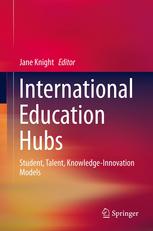

Most ebook files are in PDF format, so you can easily read them using various software such as Foxit Reader or directly on the Google Chrome browser.
Some ebook files are released by publishers in other formats such as .awz, .mobi, .epub, .fb2, etc. You may need to install specific software to read these formats on mobile/PC, such as Calibre.
Please read the tutorial at this link: https://ebookbell.com/faq
We offer FREE conversion to the popular formats you request; however, this may take some time. Therefore, right after payment, please email us, and we will try to provide the service as quickly as possible.
For some exceptional file formats or broken links (if any), please refrain from opening any disputes. Instead, email us first, and we will try to assist within a maximum of 6 hours.
EbookBell Team

5.0
98 reviewsEducation hubs are the newest development in the international higher education landscape. Countries, zones and cities are trying to position themselves as reputed centres for higher education and research.
But given higher education’s current preoccupation with competitiveness, branding, and economic benefits are education hubs merely a fad, a branding exercise, or are they an important innovation worthy of serious investment and attention? This book tries to answer the question through a systematic and comparative analysis of the rationales, actors, policies, plans and accomplishments for six serious country level education hubs - United Arab Emirates, Qatar, Malaysia, Hong Kong, Singapore and Botswana .
The in-depth case studies shows that "one size does not fit all". A variety of factors drive countries to prepare and position themselves as an education hub. They include income generation, soft power, modernization of domestic tertiary education sector, economic competitiveness, need for trained work force, and most importantly a desire to move towards a knowledge or service based economy. In response to these different motivations, three different types of education hubs are being developed: the student hub, talent hub, and knowledge/innovation hub.
Scholars, policy makers, professionals, students and senior decision makers from education, economics, geography, public policy, trade, migration will find that this book challenges some assumptions about crossborder education and provides new insights and information.